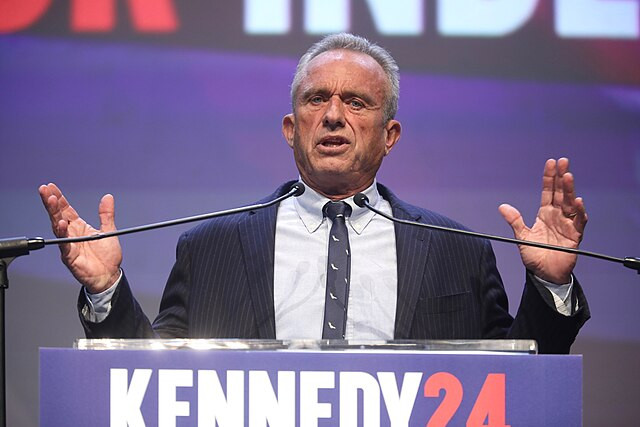Independent presidential candidate Robert F. Kennedy Jr. has vowed to challenge a potential TikTok ban in the United States, arguing that the move is unconstitutional and a "smoke screen" for other issues. In a statement on social media platform X, Kennedy wrote, "Don't be fooled - the TikTok ban is not about China harvesting your data. That's a smoke screen."
Kennedy's comments come in the wake of President Biden signing a $95 billion national security package that includes language to ban TikTok in the U.S. if the app's Chinese parent company ByteDance does not sell the app within 9 to 12 months. ByteDance officials have stated that they have no intention of selling the app, despite the looming threat of a ban.
"Foreign media reports that ByteDance is exploring the sale of TikTok are untrue," the company said in a statement, adding that it "doesn't have any plan to sell TikTok." A spokesperson for TikTok also said that the law is "unconstitutional" and that they "will challenge it in court."
Kennedy echoed these sentiments, arguing that China does not own the majority of TikTok and that the company has already agreed to put its data behind a U.S. firewall, a deal that he claims the Biden administration rejected. "Congress and the administration don't understand that TikTok is an entrepreneurial platform for thousands of American young people," he wrote. "They want to screw them over just so they can pretend to be tough on China."
The potential TikTok ban has left many small business owners who rely on the platform for their livelihoods concerned about their future. Brandon Hurst, known as "Brandon the Plant Guy," says TikTok has changed his life through his plant delivery business. "In the last year we've been able to sell 57,000 (plants)," Hurst said, adding that his company is one of seven million small businesses on TikTok.
TikTok claims it supports more than 224,000 American jobs, and a ban would force scores of entrepreneurs to look for a new home. "I have friends and family members that work for me and help package plants and orders," Hurst said. "So this goes beyond just me now. This is a team of eight other people that would lose their jobs."
Jasmine Enberg, an analyst for the data firm eMarketer, believes that Meta would be "one of the biggest beneficiaries" of a TikTok ban, with Instagram Reels being "the most natural fit" to replace the platform. However, she notes that while the technology can be replicated, the culture cannot.
For small business owners like Hurst, the uncertainty surrounding a potential TikTok ban is a significant concern. While he has a presence on other platforms like Instagram, he admits that he hasn't thought about what he would do in the event of a ban. "There's just not that many places you can live sell. So I haven't thought about it yet, to be honest. I'm not sure...what we would do," he said.
As the clock ticks down on TikTok's future in the United States, the platform and its users are preparing for a legal battle to challenge the constitutionality of the ban. Meanwhile, small business owners who have built their livelihoods on the app are left to grapple with the potential fallout and search for alternative platforms to sustain their businesses.
Kennedy's threat to file a lawsuit challenging the TikTok ban on constitutional grounds adds another layer to the ongoing debate over the app's future in the U.S. As the situation unfolds, it remains to be seen how the courts will respond to the legal challenges and what the ultimate fate of TikTok and its millions of users will be.






